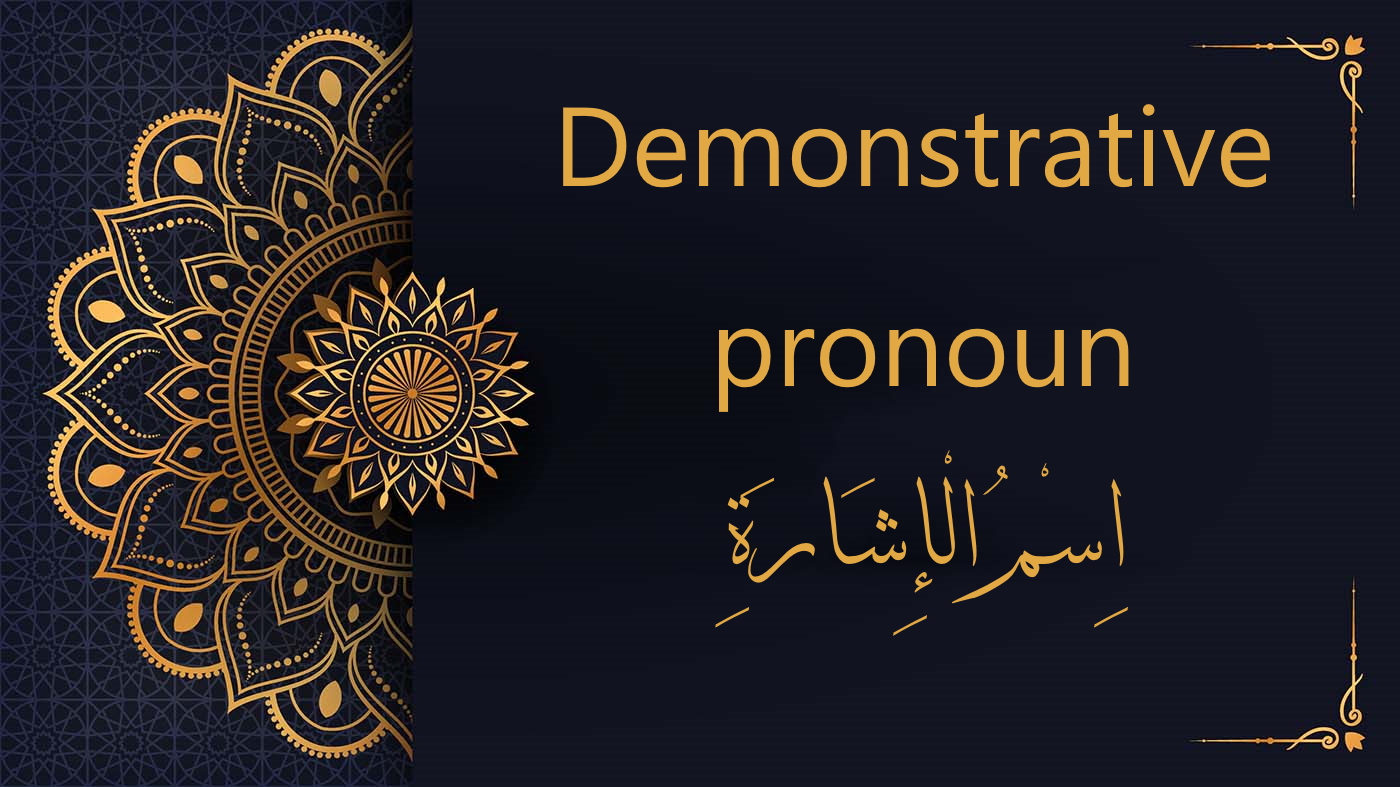
Demonstrative Pronouns in Arabic
اِسْمُ الْإِشارَةِ
Introduction to the arabic demonstrative pronouns
In Arabic, words utilized to indicate or refer to specific items are termed as:
Demonstrative Pronouns – اِسْمُ الْإِشارَةِ.
These pronouns are essential tools in language to specify particular objects or persons without naming them directly. A classic instance in Arabic would be:
This is a book (complete sentence)
كِتَابٌ = مُشارٌ إِلَيْهِ
هَذا = اِسْمُ الإِشارَةِ
ذَلِكَ الْكِتَابُ
That book (incomplete sentence)
الْكِتَابُ= مُشارٌ إِلَيْهِ
ذَلِكَ = اِسْمُ الإِشارَةِ
In Arabic, هذا and ذلك serve as demonstrative pronouns, known as اِسْمُ الإِشارَةِ. When indicating specific objects, the term used for the pointed-to item is مُشارٌ إِلَيْهِ. By appending ال to مُشارٌ إِلَيْهِ, the phrase conveys a sense of incompletion, akin to saying “that book” in English.
Arabic demonstrative pronouns are categorized by proximity:
- For objects close by: اِسْمُ الإِشارَةِ لِلْقَرِيْبِ
- For distant objects: اِسْمُ الإِشارَةِ لِلْبَعِيدِ
Both forms are treated as definite or proper nouns in grammatical terms.
Table of Near-Distance Demonstrative Pronouns in Arabic
Masculine
Singular
هَذَا
This
Dual
هَذَيْنِ – هَذَانِ
These (two)
Plural
هَؤُلآءِ
These (all)
Feminine
Singular
هَذِهِ
This
Dual
هَاتَيْنِ – هَاتَانِ
These (two)
Plural
هَؤُلآءِ
These (all)
Demonstrative Pronouns in Arabic: Singular and Plural Distinctions
In the Arabic language, demonstrative pronouns exhibit some unique characteristics when it comes to distinguishing between singular and plural, as well as between human and non-human nouns:
-
Human Plural Reference:
- For human beings, when referring to a group regardless of gender, the plural form هَؤُلآءِ (pronounced: ha’ulā’i) is used.
- Example: هَؤُلآءِ الأطفال (ha’ulā’i al-atfāl) means “These children”.
-
Non-Human Plural Reference:
- For non-human plural nouns and broken plurals, even if they are technically plural, the feminine singular demonstrative pronoun is employed.
- The feminine singular form هَذِهِ (pronounced: hādhihi) is used for this purpose.
- Example: هَذِهِ الكتب (hādhihi al-kutub) means “These books”, even though “books” is plural.
Examples from the Noble Quran
وَإِنَّ هَـٰذِهِ أُمَّتُكُمْ أُمَّةً وَاحِدَةً وَأَنَا رَبُّكُمْ فَاتَّقُونِ
And indeed this, your religion, is one religion, and I am your Lord, so fear Me.” (23:52)
وَهَـٰذَا كِتَابٌ مُّصَدِّقٌ لِّسَانًا عَرَبِيًّا
And this is a confirming Book in an Arabic tongue (46:12)
قَالُوا إِنْ هَـٰذَانِ لَسَاحِرَانِ
They said, “Indeed, these are two magicians (20:63)
ثُمَّ أَنتُمْ هَـٰؤُلَاءِ تَقْتُلُونَ أَنفُسَكُمْ
Then, you are those [same ones who are] killing one another (2:85)
Note: In Arabic, if a demonstrative pronoun appears in a possessive sentence, it follows the possessive phrase.
قَالَ إِنِّي أُرِيدُ أَنْ أُنكِحَكَ إِحْدَى ابْنَتَيَّ هَاتَيْنِ
He said, “Indeed, I wish to wed you one of these, my two daughters (28:27)
Table of Arabic Demonstrative Pronouns for Far Distances
Masculine
Singular
ذَلِكَ
That
Dual
ذَيْنِكَ – ذَانِكَ
Those (two)
Plural
أُولئِكَ
Those (all)
Feminine
Singular
تِلْكَ
That
Dual
تَانِكَ – تَيْنِكَ
Those (two)
Plural
أُولئِكَ
Those (all)
In Arabic, the plural form ‘أُولئِكَ‘ serves as a far-distance demonstrative pronoun applicable to both male and female subjects, but is exclusively used for human beings. For non-human entities or ‘broken plurals’, the singular feminine form ‘تِلْكَ‘ is employed.
Illustrations from the Holy Quran
تِلْكَ الرُّسُلُ
Those messengers (2:253)
ذَٰلِكَ الْكِتَابُ لَا رَيْبَ ۛ فِيهِ ۛ هُدًى لِّلْمُتَّقِينَ
This is the Book about which there is no doubt, a guidance for those conscious of Allah (2:2)
In the aforementioned examples, ذَٰلِكَ and تِلْكَ, though typically denoting distance, can also refer to nearby objects to stress their significance or magnitude.
فَذَانِكَ بُرْهَانَانِ مِن رَّبِّكَ
for those are two proofs from your Lord (28:32)
أُولَـٰئِكَ عَلَىٰ هُدًى مِّن رَّبِّهِمْ ۖ وَأُولَـٰئِكَ هُمُ الْمُفْلِحُونَ
Those are upon [right] guidance from their Lord, and it is those who are successful. (2:5)
ذَٰلِكُمَا مِمَّا عَلَّمَنِي رَبِّي
That is from what my Lord has taught me (12:37)
ذَٰلِكُمُ اللَّـهُ رَبُّكُمْ فَاعْبُدُوهُ ۚ أَفَلَا تَذَكَّرُونَ
That is Allah, your Lord, so worship Him. Then will you not remember? (10:3)
Note: In the two preceding examples, both ذَٰلِكُمَا and ذَٰلِكُمْ appear. While they may look like dual and plural forms, they are singular in nature; it’s the associated pronouns that are dual and plural.
The terms هَاهُنَا (meaning “here”) and هُنَالِكَ (meaning “there” and “then”) function as demonstrative pronouns denoting both place and time. For instance:
فَاذْهَبْ أَنتَ وَرَبُّكَ فَقَاتِلَا إِنَّا هَاهُنَا قَاعِدُونَ
so go, you and your Lord, and fight. Indeed, we are remaining right here. (5:24)
هُنَالِكَ دَعَا زَكَرِيَّا رَبَّهُ
at that, Zechariah called upon his Lord (3:38)
Conclusion
This lesson on Arabic nuances concludes here. Insha’Allah, our subsequent session will delve into the relative pronouns.
Al-dirassa Institute invites you on a linguistic journey with our expert teachers to master the Arabic language. Should you wish to further your studies, we welcome your inquiries.
Chosen and Trusted by Thousands of Satisfied Learners
Discover the experiences of our delighted clients who have thoroughly enjoyed utilizing this standout feature.
Alhamdulillah I‘m very pleased with the arabic and Qur’an lessons I receive from teacher Umm Tasneem and I‘m also content with the al-dirassa administration team who were very quick in answering any questions I had. In a month I progressed a lot and I cannot wait to continue my studies with al-dirassa. May Allah reward everyone at al-dirassa.
 Verified review - view original
Verified review - view original
My Qur’an teacher is fantastic, she teaches me in a loving and kind way where I look forward to the lessons and learn so much. My Arabic teacher is equally as nice and has a lot of patience with me, she has great expertise in the field and I’ve progressed really quickly with her. Thank you Al-dirassa!
 Verified review - view original
Verified review - view original
Book your free trial lesson
Don’t want to go through the translation anymore?
30 free minutes with your qualified Egyptian teacher.




